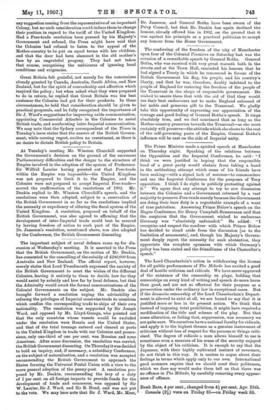The important subject of naval defence came up for dis-
cussion at Wednesday's meeting. It is asserted in the Press that the British Government, on the motion of Mr. Deakin, has consented to the cancelling of the subsidy of £240,000 from Australia and New Zealand. The official report, however, merely states that Lord Tweedmouth expressed the anxiety of the British Government to meet the wishes of the different Colonies, leaving it entirely to, them to decide how far they would assist by subsidy and how far by local defence, but that the Admiralty would await the formal communications of the Colonial Governments on the subject. Mr. Deakin also brought forward a resolution urging the advisability of refusing the privileges of Imperial coastwise trade to countries which confine the corresponding trade to ships of their own nationality. The resolution was supported by Sir Joseph Ward, and opposed by Mr. Lloyd-George, who pointed out that the only countries whose vessels would be excluded under the resolution were Russia and the United States, and that of the total tonnage entered and cleared at ports in the United Kingdom in trade with our Colonies and posses- sions, only one-third of one per cent. was Russian and none American. After some discussion, the resolution was carried, the British Government dissenting. On Thursday it was decided to hold an inquiry, and, if necessary, a subsidiary Conference, on the subject of naturalisation, and a resolution was accepted recommending the British Government to approach the States forming the Universal Pastel Union with a'view to the more general adoption of the penny-post. A resolution pro- posed by Mr. Deakin, recommending the levy of a duty of 1 per cent. on all foreign imports to provide funds for the development of trade and commerce, was opposed by Sir W. Laurier, Sir J. Ward, and Sir R. Bond, and was not put to the vote. We may here note that Sir J. Ward, Mr: Moor,
Dr. Jameson, and General Botha have been sworn of the Privy Council, but that Mr. Deakin has again declined the honour, already offered him in 1902, on the ground that it was against his principle as a practical politician to accept any honour from the Home Government. .










































 Previous page
Previous page